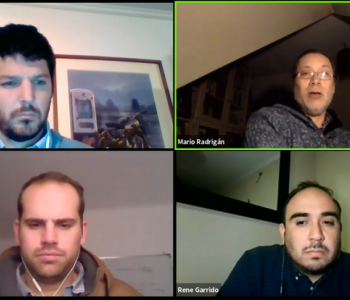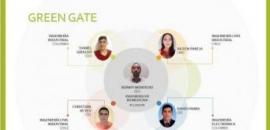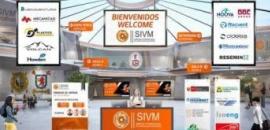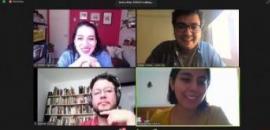You are here
Successful webinar of the Faculty of Engineering promotes debate on new methods of waste management

Monday, July 13, 2020
Mario Radrigán, director of the International Center of Social and Cooperative Economy (CIESCOOP in Spanish), Agustín Correa, new business manager of Triciclos S.A. and Diego Riveaux from the Regional-Ministerial Secretariat for the Environment discussed about new alternatives for a sustainable and conscious economy of the environment.
The International School of Sustainable Development and Circular Economy of the Faculty of Engineering host the seminar “Building a different economy: the gaps between circular economy and sustainable development in Chile”, which was moderated by the school director, Dr. Rene Garrido Lazo.
This talk was focused on the viability of building a new economy starting from a lineal to circular economy, and where we could hear different perspectives from the Academy, the public and the private sector, and the civil society represented by the audience.
Garrido, also academic from the Department of Geographical Engineering, introduced the topic by emphasizing the need to work for the Agenda 2030 on sustainable development. According to his words, in order to do that it is necessary to identify and address the most serious environmental problems of our time. He added that the current global situation is representing the weakness of the traditional economical systems, since many countries are facing recessions and severe climate crisis. In this context, Garrido mentions that it is essential to discuss about the use of renewable and non-renewable energies, which are “being used as tradeable currency for the progress,” he says.
Now, Latin America, especially our country, has established regulatory policies to promote circular economy as a mean to achieve sustainable development; however, Garrido points out that these policies could be insufficient, should people depend on policies and laws to start making a change and should this strategy have the same impact in different places of the country.
In this way, the anthropologist Mario Radrigán, academic of the Faculty of Administration and Economy at the Universidad de Santiago de Chile and director of CIESCOOP, talked about the scope of social and solidarity-based economy, also called “third sector”. In simple words, this involves social organizations, the labor or trade union, indigenous communities and associations, corporations and foundations, mutual societies, among others. This economy, according to the expert, “allows a predominance of the human being and the social object over the capital. We understand this is a main that depends on the decisions that people make with the purpose of improving their lives.” Furthermore, he stood that right now there are 1,2 billion members in cooperatives and 400 million in mutual societies worldwide. “In total, 1,6 billion of people are providing with goods and services to their partners, basically half of the world population,” explained.
Regarding with national figures, a research from the Public Policies Center of Universidad Católica de Chile about civil society in 2016, recorded 230 thousands co-organizations in comparison with the 106 thousand that numbers showed in 2005. These organizations and associations work together for the sustainable development of their communities, taking into account that the outcomes of every enterprises must be distributed equally.
On the other side, Agustín Correa from Triciclos S.A. and academic of the Faculty of Engineering at the Universidad Católica talked about the experience this enterprise is having on promoting circular economy. “We became well known thanks to the public recycling centers, where we receive all kinds of material and teach people how to do it,” he says. “This model started eight years ago and now we have consulting services in Ecuador, Uruguay, Paraguay, Argentina, Bolivia, Mexico and Costa Rica, and operations services in Chile, Brasil and Colombia” added. According to his explanation, “38% of atmospheric emissions can be reduced if we adopt a circular strategy of production and maintenance in the building industry. Plus, 70% of the transportations emissions could be reduced as well as 49% of the emissions from the food industry and its waste.”
Correa also states that it is fundamental to remove the “trash” and “waste” concepts from our culture and incorporate them as inputs. “It is important to use the products and materials at their maximum capacity service and regenerate the natural systems. In order to achieve this, some alternatives rely on remanufacturing, reusing, maintaining, extending and sharing”, points out.
Lastly, the Regional-Ministerial Secretariat for the Environment, Diego Riveaux, clarified that all measures taken are long-term ones; therefore, its application does not necessarily depend on the current government. However, he affirmed that the current Ministry of Environment is working towards circular economy in all areas not only related with waste production and reduction, but also with a new way of generating economy.”
In that sense, the government has set two goals to meet for 2040 that expects to increase recycling up 60% and to reach not more than 10% of waste in landfill sites.
Written by Catalina Águila
Translated by Javiera Díaz



